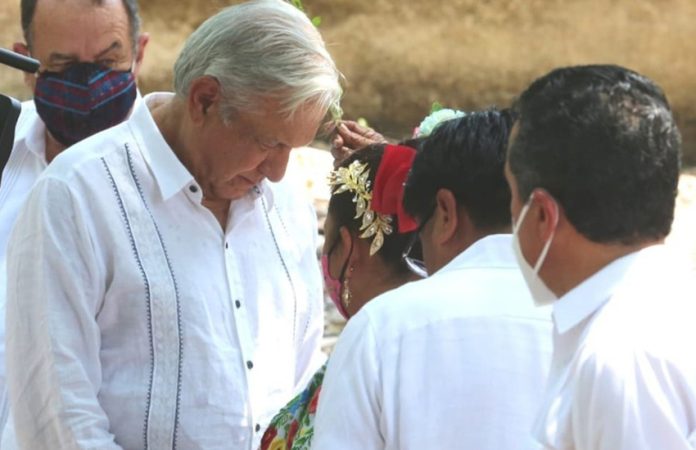The federal government on Monday apologized to the Maya people of Mexico and beyond for what it said was five centuries of abuse committed by foreign and Mexican authorities and longstanding discrimination that continues to the present day.
President López Obrador offered the apology at an event at the Caste War Museum in Tihosuco, Quintana Roo, saying that it was an “imperative of government ethics” and a result of his own personal convictions.
“We offer the most sincere apologies to the Maya people for the terrible abuse that private individuals and national and foreign authorities committed in the Conquest, during three centuries of colonial domination and two centuries of Mexican independence,” he said.
The president said that all indigenous peoples of Mexico have suffered “exploitation, dispossession, repression, racism, exclusion and massacres” and continue to suffer the same “shameful” abuses today.
“… The Yaqui and the Maya have been … treated the worst, [they are] the victims of the greatest cruelty,” López Obrador added.
The commitment of the federal government is to “listen to, attend to and respect everyone but to give preference to the neediest, especially the Maya and the indigenous people of all the cultures of Mexico,” he told attendees, among whom were representatives of the Maya community, Interior Minister Olga Sánchez, Guatemalan President Alejandro Giammattei and the governors of Quintana Roo, Yucatán, Campeche, Tabasco and Chiapas.
The president’s apology came two years after he revealed that he had written the king of Spain and Pope Francis to ask that they apologize for the indignities suffered by the native peoples during the Conquest.
The Spanish government rejected the request, while a spokesman for the Vatican said the pope had “already spoken with clarity about this issue.”
At Monday’s ceremony — one of a series of events to mark 200 years of Mexican independence and the 500th anniversary of the Spanish Conquest, Interior Minister Sánchez asked the Maya people for forgiveness on behalf of the government and pledged that federal authorities will work to build a more inclusive, fairer and more fraternal Mexico.
“To the Maya people of Mexico, today, in the name of the Mexican state, we ask for your forgiveness for the offenses committed against you throughout our history and for the discrimination of which you are still victims in the present,” she said.
“With this act, we want to look together toward the future with the confidence that we’re planting a just and worthy seed of peace that will allow us to have abundant fruit; … one of the fruits of forgiveness is peace,” Sánchez said.

The interior minister acknowledged that the Mexican state acted particularly cruelly toward the Maya during the Caste War of Yucatán, a 19th-century conflict between indigenous and European-descended residents.
“These people have suffered exploitation and mistreatment for centuries, [ranging] from … dispossession of their lands and the consequent displacement to injustices and humiliations in their own territory,” Sánchez added.
But a Maya community representative said an apology on its own was not enough.
Ana Karen Dzib Poot said “concrete actions” are needed and urged the government to create a “Maya people’s memory, recognition and justice commission” and to draw up a development plan to respond to the most pressing needs of residents of southeastern Mexico. Dzib Poot also called for Maya people’s rights to be enshrined in the Mexican constitution.
The overarching aim must be to put an end to the injustices and discrimination suffered by the Maya, she said.
For his part, the Guatemalan president noted that Maya people face a range of problems today, including violence at the hands of organized crime. They also suffer from malnutrition, social exclusion and a lack of development in the areas where they live, Giammattei said, acknowledging that many Maya are forced to migrate as a result.
Millions of modern-day Maya live in Mexico’s south and southeast as well as in Central American countries such as Guatemala and Belize.
López Obrador believes that his government’s signature infrastructure project — the Maya Train — will spur social and economic development in Mexico’s long-neglected southeast. But many Maya are opposed to the project on environmental grounds or because they believe it will bring few economic benefits to the region’s residents.
